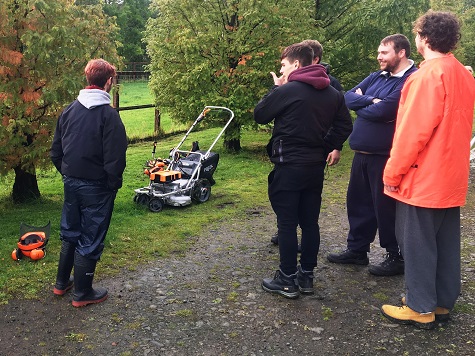Landscaping, horticulture and agricultural engineering students at the unique SRUC Oatridge campus in West Lothian near Edinburgh recently participated in an event which gave them the opportunity to learn more about Pellenc’s battery technology and gain some hands on experience with a wide range of equipment.

SRUC Oatridge students introduced to Pellenc battery-powered equipment
SRUC College is a bespoke land based industries institution based throughout Scotland which offers a number of courses at all levels from college and university level study, through to postgraduate, consultancy and research opportunities. Many of the courses at the Oatridge campus relate to the ways in which we make use of the land and natural resources around us - from agriculture and horticulture to veterinary nursing and equestrianism, and a huge variety of land based topics in between.
The College has a philosophy of continuously exploring the science that supports these land-based industries, and the way they interact with and support the environment around them. It is for this reason that Thomas Meenagh, a horticulture lecturer at Oatridge, decided that it would be a good idea for the students to become familiar with the increasingly popular battery powered machinery.
“I think that in every walk of society it is becoming common knowledge that we should be more environmentally friendly and be producing less CO2 and greenhouse gasses. An awful lot of hand held powered equipment used in land based industries comes with two-stroke engines which burn off fuel and oil, and so it is good to see the likes of landscaping and horticulture industries moving towards battery powered machinery.
“As a teaching institution we should be ahead of the game; we should be at the forefront of this kind of development - so that is why I wanted to organise some kind of event which could introduce the students to this equipment.”
Having being in the market to buy some battery powered equipment, Thomas’ research led him to Pellenc, which is exclusively distributed in the UK and Ireland by Etesia. He arranged for four sessions to take place over two days in which Etesia representatives firstly delivered a theory based session which offered a greater insight into the Pellenc technology, followed by a practical demonstration. The students were then invited to trial the equipment for themselves.
“The students were delighted because they got to use the equipment to cut hedges, cut grass, use brush cutters and much more. The feedback was excellent and they were very impressed with the equipment. They commented on it being really light - a lot lighter than equipment they had been exposed to in the past. They also remarked on the equipment having very low vibration, being very quiet and extremely efficient.”
In reflecting on a successful event, Thomas believes that it was essential that the students got a first glimpse of the products that they could very well be using on a regular basis in the future.
“I would anticipate that in five years from now this kind of equipment will be the norm throughout the industry. By the time the students graduate and get jobs no doubt the two stroke fuel equipment will become less and less common and the battery powered equipment will be more dominant in the workplace."